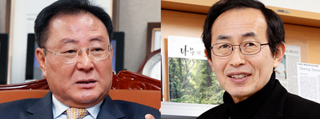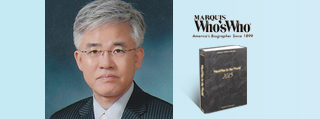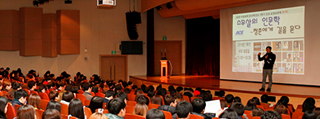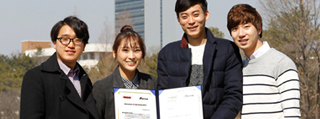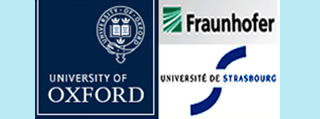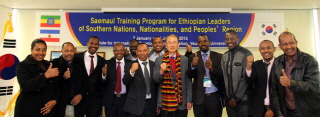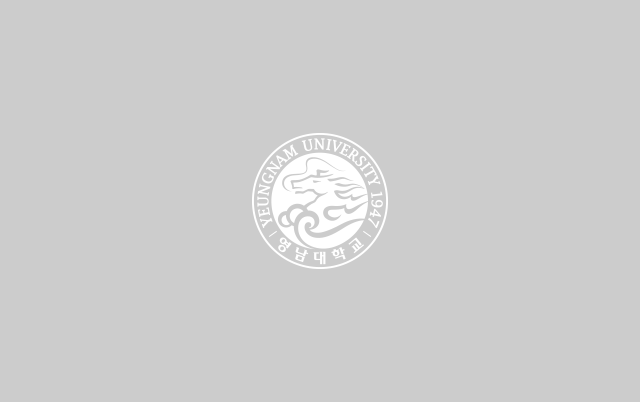-
Park Chung Hee School of Policy and Saemaul recruits a number of scholars such as former professor at Seoul National University Jwa Seung-hee, former ambassador Cho Hwan-bok, former Korea Forest Service director Lee Don-goo, and former professor at Seoul National University Noh Hwa-joon [2015-3-18] <Professor Jwa Seung-hee (left) and Visiting Professor Cho Hwan-bok for the 2015 school year at Park Chung Hee School of Policy and Saemaul> A number of scholars in fields related to the YU Park Chung Hee School of Policy and Saemaul that passes on Korea's experiences including 'Saemaul Science' were recruited as professors. For example, Jwa Seung-hee (68), a former professor at Seoul National University who is a celebrated economist who emphasized liberal market economics, was appointed as a chair professor at the Park Chung Hee School of Policy and Saemaul from YU President Noh Seok-kyun. Professor Jwa earned his PhD in economics at UCLA and after working the US Federal Reserve Bank (FRB) economy research institute and serving as the director of the Korea Economic Research Institute, he worked as a guest professor at Seoul National University and the KDI Graduate School of International Policies. He also served as a presidential advisor for policy planning, government reforms, and strengthening of national competitiveness. Former Ambassador Cho Hwan-bok (63), who was the first Korean to receive two medal of honors from the Mexican government, was also recruited as a guest professor at the Park Chung Hee School of Policy and Saemaul from the new semester. Professor Cho majored in trade at Seoul National University and joined the Ministry of Foreign Affairs in 1975 and served as the economy minister of the Korean embassy in China, consulate general in Hong Kong, secretary general of the Northeast Asia History Foundation, ambassador to Mexico, and director of the Saemaul Undong Center international cooperation committee. In April 2013, Former Director of the Korea Forest Service Lee Dong-goo (69) and in March 2014, Former Seoul National University Professor Noh Hwa-joon (74) were appointed as chair professors for the YU Park Chung Hee School of Policy and Saemaul. Professor Lee Don-goo earned his PhD in agricultural sciences at University of Iowa in the United States and served as the chairperson of the International Union of Forest Research Organizations (IUFRO), joint president of the Forest of Life, and the dean of the Seoul National University College of Agriculture and Bio Sciences. He then served two terms as the 19th director of the Korea Forest Service from February 2011 to March 2013. Professor Noh Hwa-joon earned his PhD at Syracuse University in the US and served as the dean of the Seoul National University Graduate School of Public Administration, research professor of the US federal government's Environmental Agency and joint chairperson of the Public Administration Information Sharing Committee. A common trait of these scholars is that they were key players in the development of Korea's economy who supported the 'Miracle of Hangang' in theory and in practice. Therefore, their field experiences will be truly 'living textbooks' for the education of the Saemaul Undong and Saemaul spirit. Accordingly, the YU Park Chung Hee School of Policy and Saemaul recruited these figures as professors to provide very important experiences and knowledge to international students who came to study at YU with their own missions from under-developed countries. Meanwhile, after establishing the Park Chung Hee School of Policy and Saemaul that gives master's degrees in 'Saemaul sciences' for the first time in Korea in November 2011, YU opened the Department of Saemaul Studies and International Development as an undergraduate course in 2005 as it establishes as the world's only 'Saemaul Science' education institute. Furthermore, it is becoming a forward base for fulfilling the global social responsibilities of Korea by sharing the development experiences of Korea including the Saemaul Undong to high ranking government officials and other personnel from 60 different countries, as well as international organizations such as the UN International Fund for Agricultural Development (IFAD), the Asia Africa Rural Development Organization (AARDO) and the Asian Forest Cooperation Organization (AFoCO).
-
-
<Premium humanities lecture 'Humanities for 20 Year Olds - Asking the Way to Youths' opened on 3rd.> The YU Cheonma Art Center Chamber Hall was filled with students gathered to sit in for a humanities lecture on the 3rd. They came to attend the premium humanities lecture offered by YU from the first semester of 2015, 'Humanities for 20 Year Olds - Asking the Way to Youths'. 'Humanities for 20 Year Olds - Asking the Way to Youths' is a 3 hour regular curriculum course (3 credits) from 3 p.m. to 6 p.m. every Tuesday beginning on the 3rd. Despite being in its first year, the 500 capacity lecture was filled as soon as applications started, showing the hot interest of students. Due to the large capacity of 500 students, lectures will be held at the Cheonma Art Center instead of regular lecture rooms. This lecture organized by Professor of Philosophy Choi Jae-mok was provided so that students can ask what is the right creative and hopeful path for them during their youth where they think about many things by listening to the advice and interacting with prominent figures in humanities. This lecture course, which kicked off under the theme, 'Humanities of 20 Year Olds, What to Listen to and Think about?', will be conducted as a 13 week marathon course of key figures in humanities from various fields every week. It is very rare for a regular relay lecture to be offered in regional colleges jointed by prominent scholars and humanities scholars famous for public lectures and books. Jeon Seung-yong (23, senior in the Department of Food Resource Economics) said, "I heard a lot about the importance of humanities and was highly interested in it, but I did not have many opportunities to actually listen to the lectures," and added, "I am very excited that I will be able to listen to the lectures of very famous humanities lecturers and be able to speak with them for a semester." Lecturers participating in the course were organized of prominent speakers and college professors selected through a student survey last year. They are the philosopher Kang Shin-joo, journalist Hong Se-hwa famous for the book 'I am a taxi driver of Paris', Woosuk University Professor Ahn Do-hyun, YU Professor of Education Park Cheol-hong, Academy of Korean Studies Professor Han Hyeong-jo, writer and literature critic Goh Mi-sook, Dosan Seowon Classical Scholar Culture Training Center President Kim Byeong-il, Rural Doctor Park Gyeong-cheol, Sungkyunkwan University Professor Shin Jeong-geun, YU Liberal Arts Professor Park Hong-gyu, Gwangju Institute of Science and Technology Professor Lee Yong-joo, and Seogang University Professor of Philosophy Choi Jin-seok. On the first day of the lecture on the 3rd, YU President Noh Seok-kyun took the podium to emphasize to students the importance of humanities. This lecture is scheduled to be a public lecture in which the general public can also attend. It is therefore expected to quench the thirst for humanities among students and local residents who are eager to attend lectures by celebrity lecturers, while also expanding the base for humanities in the region. Professor Choi Jae-mok, who organized the lecture course, said, "This will be a time for students to be able to ponder about topics that twenty-year-olds are in dire need of such as why and for what people have to live, how one should live, why we need to make money and what kind of job we must have, what is a successful life, why humans should be ethical, is there hope for us, and how to overcome our times of thoughtless wandering." He added, "By listening to the lecture and through question and answer sessions, students will be able to improve their creative abilities for searching and pioneering their own paths."
-
<YU students who helped sign export contracts for small and medium businesses to the North American market> (from left to right: Jung Ji-won, Seok Hye-ran, Hwang Sung-hwan, Kim Tae-hoon) YU students played a key role for signing exports contracts to the North American market by regional small and medium companies. It was a massive contract amounting to 750,000 US dollars. Key members for winning the export contracts were Hwang Sung-hwan (25), a senior in the School of Business, and Kim Tae-hoon (25), Jung Ji-won (23) and Seok Hye-ran (23), who are all seniors in the School of International Economics and Business. Together with Roser (CEO Kim I-haeng) and Feroof (CEO Park Seo-jeong), which are both local companies specializing in roof materials manufacturing, they attended the '2015 International Roofing Expo' held in New Orleans, Louisiana in the United States for three days from the 24th to 26th, where they signed export contracts worth a total of 750,000 dollars. Roser signed a 400,000 dollar deal with 'Atlantpacific', a roof materials manufacturing and distribution company located in San Francisco, US, and Feroof signed a 350,000 dollar contract with METSTAR based in Canada. The 'International Roof Expo', which began in 2004, is one of the world's largest roofing and construction material expos in the world joined by the US, Canada, and Central and South American countries. This year, there were 1,100 booths operated by over 400 companies and attracted over 10,000 visitors. <YU students signed an export contract with 'METSTAR' of Canada by helping Feroof, a local company.> Students who participated in this expo carried out pre-marketing for participating companies three months prior to the expo on behalf of Roser and Feroof. Students not only studied and made analyses to understand the products, but also made necessary preparations needed for marketing such as overseas market surveys and obtaining buyer lists to participate in the expo. It was said that their skills were as good as any other person currently working in the industry. Roser Executive Director Kim Jung-taek said, "We were able to successfully complete this expo thanks to the knowledge, experience and passionate activities of college supporter students," and added, "We thank the students for their great deal of help and if we have the opportunity, we hope to continue to build a cooperative relationship with YU." Their achievement was not made overnight. They are agents of the YU 'global trade expert promotion (GTEP) project team' and 'Gyeongbuk PRIDE product support center' college supporters (Jung Ji-won, Seok Hye-ran), and continuously worked on their capacities as trade experts. In particular, Hwang Sung-hwan and Kim Tae-hoon are global trade experts under the YU GTEP project team possessing proficient foreign language skills and expert trade knowledge. They are practically prepared global trade experts. They have been active as agents of the 8th GTEP project team and gained various knowledge and experience in trade. In just the past year, including three overseas expos such as the '2014 Dubai Middle East Confectionery Expo', they participated in a total of five expos and gained expertise by working in the frontlines of corporate exports. Kim Tae-hoon, who helped with the contract for Feroof at this expo, said, "By participating in overseas expos with current employees of companies, I was able to learn about a lot of practical knowledge that is not available at school," and added, "Based on such experience and knowledge, I want to become a trade expert that helps small and medium companies having unique technologies enter foreign markets." Meanwhile, YU was recognized as an incubation center for young trade experts and have continuously pursued government-funded projects from 2002. Recently, it was selected for the 'regional specialized young trade expert fostering project' hosted by the Ministry of Trade, Industry and Energy and the Korea International Trade Association and will continue the 'GTEP project team 9-11' up until 2018. In 2002, YU began with the Ministry of Industry and Resource TI (Trade Incubator) project and will thus foster young trade experts for 16 years until March 2018.
-
<YU President Noh Seok-kyun (left) is giving a photographic edition of Cheonggudo (Treasure 1594) of the YU Museum to University of Oxford Dean Hamilton of England as a gift> YU (President Noh Seok-kyun) signed MOUs on student exchange and joint research with prestigious universities and major research institutes of Europe to further expand its global education and research network. YU President Noh Seok-kyun, Industry-Academic Research Office Director Park Jin-ho, LINC Project Team Director Lee Hee-young, IT-Energy-BT Industry Customized Creative Chemical Human Resources Fostering Project Team Director Jung Jae-hak, School of Chemical Engineering Professor Oh Soo-young, and Department of Electronic Engineering Professor Park Il-gyu traveled together from the 9th to the 17th, right before the Lunar New Year holidays to the University of Oxford in England, University of Strasbourg in France, and Anhalt University, Martin-Luther University, and Fraunhofer-Gesellschaft to sign MOUs to pledge research cooperation and human exchange in fields such as renewable energy, nanotechnology, new materials, pharmaceuticals, and precision chemicals. The University of Oxford that signed an MOU for exchange with YU is the oldest university in English-speaking nations. It boasts the world's top level in basic academic sectors and is one of the top 5 prestigious public universities in the world. With the signing of this MOU, Oxford and YU agreed to pursue research cooperation in the energy and nano-technology sectors, and decided to install the 'YU-Oxford Lab' within the YU LINC Project Team. Accordingly, it is expected that this will be an opportunity to upgrade the research and educational capacities of YU to global levels. The University of Strasbourg in France is the largest university in France and graduated 10 Nobel Prize winners. Three of them are currently serving as professors and is world famous for convergence education that removed barriers between majors and its research capacities. It is currently carrying out international collaboration research in the solar cell sector with YU and student exchange is also active focusing on the College of Business and Economics and the YU-EU center. Through this MOU, it is expected that student exchange will be expanded to various academic fields and to review the introduction of joint PhD programs, as well as other exchanges with YU becoming more active. In particular, the University of Strasbourg is located in the province of Alsace, which is a sister-city with Gyeongsangbuk-do, so plans are being made to expand exchange and cooperation in other fields by pursuing human exchange and joint research with the University of Strasbourg starting with the renewable energy sector, which is the main industry of Gyeongsangbuk-do. <University of Strasbourg Dean Alain Beretz fourth from right in counter-clockwise direction explains the status of the university to Mr. Noh Seok-kyun> Fraunhofer-Gesellschaft of Germany, which was established in 1949, is one of the four major government-funded research institutes of Germany and it is Europe's largest and leading institute for convergence research in the applied science sector employing over 24,000 researchers. In particular, the solar power research center under Fraunhofer-Gesellschaft carries out the highest level of research in the crystallized silicon solar cell and module sectors that currently account for over 90% of the solar power industry. The first Korea-Germany collaborative research project being pursued jointly by Korea's Ministry of Trade and Germany is being conducted with the YU research team (research supervisor: Professor Park Jin-ho). With the signing of this MOU, exchange and cooperation between Fraunhofer-Gesellschaft and the YU solar cell research teams are expected to increase, and it is also anticipated that research cooperation will be pursued on advanced materials and particles. Furthermore, Fraunhofer-Gesellschaft maintains close cooperative relationships with Martin-Luther University and Anhalt University, both of which have recently become sister colleges with YU, and is leading venture start-ups and industry-academic cooperation, which is the growth engine of the German economy. Martin-Luther University is one of the oldest universities of Germany and is especially strong in basic sciences and humanities. Anhalt University is an engineering and technology college modeled after the practical education of Germany. 20% of the 9,000 enrolled students are international students from over 100 countries and is a college focusing on international cooperation. A large percentage of classes are in English and so students can enroll without taking separate exams in German, and its strength is that it provides field-oriented education specialized in each sector. With the signing of this MOU, it is expected that exchange in practical education and research will expand by linking up with the university specialized projects and LINC projects that YU has been pursuing. By constructing partnerships with the prestigious universities and research institutes of Europe that boast long histories and top-notch educational and research capacities, YU has high anticipations that it will be able to provide wide educational opportunities to students and opportunities for high level research to professors. It is further significant in that it expanded its partnerships to universities and research institutes of Europe, instead of holding fast to its international exchange pattern focused on the United States. YU President Noh Seok-kyun, who traveled to three countries in Europe in nine days said, "As the university now made sister relationships, it is now important to come up with execution plans so that it can lead to actual and practical exchange and cooperation." He added, "YU will take the lead to raise the level of college education and research of Korea, not only of YU, through mutual exchange of students and joint research among professors. As part of this, we will invite the dean of the University of Oxford for a special lecture for our students, and also meet with professors to search for real opportunities in the joint research sector." <Mr. Noh Seok-kyun shakes hands with Anhalt University President Orzessek after signing MOU>
-
Senior official of Ethiopian SNNPR (Souther Nations, Nationalities, and People's Region) with population of 15 million begins training Senior officials of the Amhara region with a population of 18 million also receiving training last year Suggesting a new Korean style international development cooperation model of repaying kindness [January 15, 2015] YU (President Noh Seok-kyun) is working hard from the start of the year for the globalization of the Saemaul Undong. Senior officials of SNNPR of Ethiopia completed an 8-day short-term Saemaul Undong training program at YU in early January. On the 13th, YU hosted a Saemaul Undong training completion ceremony for the SNNPR (Southern Nations, Nationalities and People's Region) of Ethiopia hosted by the International Development Cooperation Center (Director Choi Oe Chool). Eleven SNNPR senior officials including Vice Governor TESFAYE Belijge Dara who participated in the short-term training program of the YU International Development Cooperation Center for eight days from January 7 attended the ceremony. Ethiopia is an ally country that fought on the side of South Korea as part of the UN forces during the Korean War. After carrying out training for senior public officials from the Amhara region of Ethiopia on two separate occasions in June, this time senior officials SNNPR participated in Saemaul Undong training. This proposes a new international development cooperation model of repaying kindness of Korea that has developed through the aid of the international community. Amhara and SNNPR are large regions with populations of 18 million and 15 million, respectively. In particular, SNNPR, which is located on the southwestern tip of Ethiopia, is home to 56 of the 80 ethnic groups of Ethiopia. With Awasa being its main province, 89.98% of the 15 million residents live in farming areas, making this a farming-oriented region. The team from Ethiopia that received training at YU learned about the success experience and knowhow on economical development by Korea through economic development through the Saemaul Undong, the Saemaul Undong and rural development, Saemaul Undong and erosion control projects and livestock development for eight days. They also visited Samsung Electronics, Daegu Stadium and POSCO to get a first-hand look at the developed industries of Korea, while also having the opportunity to take a look at the development of Korea by taking field trips to the Sabang Memorial Park and National Revival Hall. Nuredin Mohammed Kemal (36), who was one of the first students enrolled at the YU Park Chung Hee School of Policy and Saemaul and now a chief at the SNNPR Marketing Cooperation Bureau, played an important role for making this Ethiopia SNNPR training to happen. Upon the suggestion of Mr. Nuredin, SNNPR felt the need for training and thus visited YU to learn about the Saemaul Undong and rural development success knowhow using only the region's budget and not any support from international organizations or private companies. SNNPR is planning to send a second team of 12 including the governor of SNNPR for eight days starting on February 1 to learn more about the Saemaul spirit and Korea's development experience. At the completion ceremony, YU International Development Cooperation Center Director Choi Oe Chool (Vice President of YU) who oversaw the training course said, "The generation of your parents and grandparents came to this land to protect the freedom of Korea 65 years ago. Thus, Korea and Ethiopia are brother countries." He added, "Though it was a short time, we thank your passion to learn the Saemaul Undong using a 'self-reliant method' of paying for your own expenses, and YU has and will continue to do its best to share the experience of Korea's compressed growth." SNNRP Vice-governor TESFAYE Belijge Dara responded, "I was deeply impressed by the development of Korea and I have become confident through this training event that Korea's Saemaul spirit and Saemaul Undong are the development models that emerging countries must apply for economic development," while adding, "We vow that once we return home, we will make self-reliant efforts in our environment to apply and practice the Saemaul spirit, and we will share the achievements for the development of Ethiopia in our next visit." At the ceremony, the trainees handed over a framed photo and the SNNPR slogan "Our diversity is our beauty. Our beauty is our unity!" that commemorates the diversity and unity of the 56 ethnic groups to show their appreciation and share friendship with their brother country. "Vow to practice the Saemaul spirit, confident as model for eradicating poverty and developing the economy for emerging countries" Meanwhile, last year YU was selected as an 'international cooperation leading university' by the Ministry of Education to actively pursue global social contribution activities to eradicate global poverty and for mutual prosperity. In 2014 alone, training and education on the Saemaul Undong and Korea's development experience was provided for 410 people from 60 countries. In November 2011, the 'Park Chung Hee School of Policy and Saemaul' was founded to foster global Saemaul leaders in emerging countries. 197 students were admitted from 50 countries in the past three years. As of the second semester of 2014, 130 international students from 47 countries are currently learning 'Saemaul sciences' and Korea's development experience. 63 students from 26 countries have graduated or completed their studies. Thanks to these achievements, the Park Chung Hee School of Policy and Saemaul was selected as the top master's degree program institute of the 'leader and instructor fostering project for regional development of emerging countries' by KOICA (Korea International Cooperation Agency) in March 2014. 68 students from 27 countries are scheduled to enroll at the Park Chung Hee School of Policy and Saemaul in March 2015. In total, 265 international students from 54 countries learned the Saemaul Undong and spirit through the YU Park Chung Hee School of Policy and Saemaul. There has been a rapid increase in demand to learn the Saemaul Undong among underdeveloped countries, and thus YU established the International Development Cooperation Center in July 2013. This center carried out training for the Saemaul Undong, regional development and emerging country tourism policy development for 290 leaders from 38 countries. Recently, the school's 'Saemaul and International Development Department' was selected as the Ministry of Education's excellent regional specialized department. Accordingly, YU will act as a leading college for international cooperation by fostering experts in Saemaul international development as a state-sponsored project for the next five years, and graduates are making a firm cornerstone to contribute to overcoming poverty and for the global mutual prosperity in the international stage.
-
First in the world to configure low-cost, light-reaction nano-substrate that simplified the etching process Published in the latest edition of the world's most authoritative academic journal in the nano-technology sector, 'Nano Scale' Expected to develop small medical sensor and light energy conversion materials [January 6, 2015] Mechanical Engineering Professor Byeon Jung-hoon (36, photo) developed a new light-reaction nano-substrate manufacturing process technology expected to be used for ultra-small medical sensors or energy conversion materials. Professor Byeon became the first in the world to configure a light-reaction substrate composed of dots and rings with nano-meter sizes (nm, 1/1 billionth meter) using mechanical processing-based technologies in atmospheric pressure/room temperature conditions. Normally, nano-meter sized metal patterns are configured through a complex lithography process of vacuum conditions used in the semiconductor or display manufacturing process. However, Professor Byeon's study placed nano-particles that attract metal film through the gas flow and temperature control in atmospheric pressure on top of a silicon substrate and additionally induced generation of metal films in room temperature to configure light-reaction substrates patterned with 40 nano-meter level nanodots and nanorings. The research results are evaluated to have suggested a new alternative to overcome the technological complexities of existing etching processes. Professor Byeon said "Using the mechanical non-etching process that controls the heat and flow of gases, it was possible to configure light-reaction nano substrates having various properties through nano-particle matter changes and static electricity control of nano-particle surfaces that induce metal film generation." He added, "It will thus be possible to be used to developed ultra-small medical sensors that react to light or as energy conversion materials that change light into heat at small costs." The results of this study were revealed on December 26 on the <Nanoscale (IF; impact factor 67.39)> website, which has the world's highest authority (top 7.6%) in the nano technology sector published by the Royal Society of Chemistry (RSC) of England under the title 'Aerosol-based soft lithography to fabricate nanoscale silver dots and rings for spectroscopic applications', and will be published this year. Meanwhile, Professor Byeon has published over 60 studies such as 'gaseous nano particle liquification and substance synthesis', 'gas synthesis using aerosol catalysts', 'organic-inorganic nano complex materials', and 'nano-patterning' in SCI grade international academic journals. In addition to Nanoscale, he is also serving as a reviewer for over 20 international academic journals such as <Angewandte Chemie-International Edition, IF 11.336>, <Small, IF 7.514>, <Chemical Communications, IF 6.718>, etc.
-
Signed industry-academic cooperation MOU with Korea South-East Power Co. and solar power companies Create additional renewable energy value using campus building roof to construct green campus [December 17, 2014] <YU signed an industry-academic cooperation agreement for the 'solar power facility installation support project for research' together with KOSEP and solar power development companies.> YU (President Noh Seok-kyun) teamed up with KOSEP (President Heo Yeob) and solar power companies to construct a green campus. In the morning of the 16th, YU signed an MOU to pursue the 'solar power facility installation support project for research (Sunny Plant Project)' together with KOSEP, Hanwha Q Cell (President Kim Hee-chul), Topsun (President Yoon Jung-taek), and Hanvit DNS (President Lee Hyun-hwa). With the signing of this agreement, Hanwha Q Cell and Topsun will provide the materials for solar power, Hanvit DNS will be in charge of solar power facility design, licensing and construction, and KOSEP will fund installation costs to install the solar power generation facilities on the roof of the YU living hall building. YU will be in charge of the solar power facility installation, operation and operational efficiency analysis, to efficiently operate and manage the solar power facilities, and provide the facility operation results and improvement plans to the partners for this. The facility is expected to produce about 119.8MWh of power a year with the approximately 100KW solar power generator. YU Industry-academic Team Leader Park Jin-ho who attended this signing ceremony said, "Through the joint project with solar power generation companies and institutes, we have constructed an industry-academic cooperation mechanism for an efficient solar power development project," and "This will be an opportunity to utilize the college building roof to create additional value in the renewable energy sector, and take a step closer in the construction of a green campus." Meanwhile, this agreement was signed as a follow-up project to the agreement made between YU and KOSEP to cooperate in renewable energy research and development projects while signing the 'MOU for leading global social responsibility activities' in June 2013'.
-
Senior educational officials of Peru learned about the Saemaul Undong and successful rural development case at YU 10 joined training including superintendent of education, college dean and mayor Over 400 people from 60 countries received education and training at YU in 2014 alone [December 15, 2014] Senior public officials of Peru pose for a photo after the completion ceremony on the 10th following the Saemaul Undong training program hosted by the YU International Development Cooperation Center “The morning bell has rung, a new morning has come~” Will this Saemaul song be heard in South America as well? With international interest of the achievements of the Saemaul Undong growing internationally, YU (President Noh Seok-kyun) spread the Saemaul Undong to educators from Peru of South America. The Saemaul Undong training completion ceremony was held on the 10th at YU hosted by the International Cooperation Development Center (Director Choi Oe Chool). A total of 10 people involved in education such as the superintendent of education of Cajamarca, education ministry administrators, mayor and college deans who participated in the 'Saemaul Undong, Regional Development and Lifelong Education', a training program of the YU International Development Cooperation Center from the 1st, attended the event. Cajamarca Province of Peru is one of the most worn down areas in Peru with a population of 1.5 million who are mostly in livestock and agriculture. A team from Peru visited YU to search for a solution to overcome their problems through the Saemaul Undong. During their 10 day schedule, they learned about the history and achievements of the Saemaul Undong, economic development through the Saemaul Undong, Saemaul Undong and rural development, and education and fostering of rural leaders, while also learning Korea's knowhow for successful rural development. In addition, the research team visited various research institutes, industrial complexes, and rural villages such as the Yeongcheon Agricultural Technology Center, Samsung Electronics, Nongshim, Maeil Milk and mushroom farms to see the success cases of Korea for their selves. In his congratulatory address at the completion ceremony, International Development Cooperation Center Director (VP) Choi Oe Chool, who oversaw the training course for educational officers of Peru, said, "The generation of your parents and grandparents helped Korea by making donations during the Korean War. This makes Korea and Peru brother countries." He added, "For the past 50 years, Korea sought for ways with the 'will do' mentality and made achievements that the international community now calls a 'miracle'. YU is striving to share our experience with the global community to make a more prosperous, safer, and happier world." In response, Cajamarca Office of Education Superintendent Félix José Silva Urbano said, "I salute the efforts of YU, which is taking the initiative to share Korea's Saemaul spirit and Saemaul Undong with emerging countries to eradicate the global poverty issue, and I am very happy that Peru is now one of the countries that will have the Saemaul Undong." He added, "We vow to practice the Saemaul spirit after going back to Peru and I hope that more talented individuals in Peru will have the opportunity to come to YU to study the Saemaul Undong and Korea's development experience." The team from Peru took the spotlight at the completion ceremony by holding a special appreciation event. All 10 of the trainees added lyrics to guitar sounds saying, "I have come from afar / Thank you for the invitation / We learned a lot about the Saemaul Undong // Our brothers in Korea / We thank you for your welcome / Truly / We thank you // Koreans and Peruvians / Through the Saemaul Undong / For a better world / We shall grow and develop." They sang this to the rhythm of a famous Peruvian folk song called 'Makahara', which is equivalent to Korea's 'Arirang'. The team from Peru is singing a folk song at the completion ceremony on the 10th. Meanwhile, YU, an 'international cooperation leading university' selected by the Ministry of Education, is actively pursuing global social contribution activities to overcome global poverty and for mutual prosperity. In 2014 alone, training and education on the Saemaul Undong and Korea's development experience was provided for 410 people from 60 countries through the Park Chung Hee School of Policy and Saemaul and the International Development Cooperation Center. In November 2011, the 'Park Chung Hee School of Policy and Saemaul' was founded to foster global Saemaul leaders in emerging countries. There are currently 130 students from 50 countries learning about Korea's development experience such as 'Saemaul sciences'. 63 students from 26 countries have graduated or completed their studies. Thanks to these achievements, the Park Chung Hee School of Policy and Saemaul was selected as the top master's degree program institute of the 'leader and instructor fostering project for regional development of emerging countries' by KOICA (Korea International Cooperation Agency) in March 2014. YU established the International Development Cooperation Center in July 2013 and this year, it conducted training on Saemaul Undong, regional development, and tourism policy development for emerging countries for 279 leaders from 37 countries this year. Recently, the school's 'Saemaul and International Development Department' was selected as the Ministry of Education's excellent regional specialized department. Accordingly, YU will act as a leading college for international cooperation by fostering experts in Saemaul international development as a state-sponsored project for the next five years, and is fulfilling its role as an internationalization leading college that fosters experts in Saemaul Undong and international development cooperation.
-
Opened software major and non-major course for scholarship support and priority when hiring Expected to raise employment rate of non-major departments such as humanities and social science tracks Expected to be advantageous to those who complete program with the revision of Samsung's employment procedure [December 7, 2012] <YU students taking the SCSC (Samsung Convergence S/W Course) class> “If you want to work for Samsung Electronics, go to YU!” YU (President Noh Seok-kyun) teamed up with Samsung Electronics to take the initiative in fostering software (S/W) experts. YU established the 'YU-Samsung Electronics S/W Human Resources Fostering Center (Director Park Chang-hyun)' inside of campus and has been operating a software human resources fostering program. The center was established through an agreement between YU and Samsung Electronics to foster human resources in software and to expand the pool in October of last year. It offers the major course 'SST (Samsung Software Track)' to foster key personnel in software and the 'SCSC (Samsung Convergence Software Course)' to foster convergent-type software personnel for non-majors. SST provides a total of 10 million won in scholarships per student chosen for the scholarships from a total of four departments such as electronic engineering, electronic engineering, computer engineering, and information and communication engineering, which are departments with majors in software. Students selected for the scholarships can join Samsung Electronics after completing the SST course and passing the software certification test prior to graduation. Currently 13 students were selected as Samsung Electronics industry-academic scholarship students through the SST and are receiving scholarship funds. SCSC, which is a course for non-majors, requires students not majoring in software to complete a total of 10 courses including seven mandatory courses related to software in order for them to be equipped with capacities in the software sector. Those who complete the courses are given priority during interviews regardless of the position applied for when applying to Samsung Electronics. Furthermore, scholarships are given to students with outstanding grades every semester and in the event that students who completed the courses earn additional credits in relevant major courses, they can earn minor or double major diplomas. It is expected that the non-major program SCSC will assist considerably for students major in humanities and social sciences when applying to Samsung Electronics. In November, Samsung announced that it would reform its employment system. In the case of the software positions, they will conduct capacity tests regarding software instead of the Samsung Aptitude Test (SSAT) and would add essays and in-depth interviews for humanities majors applying for business support positions. Accordingly, it is expected that students who completed SCSC will exhibit strengths as convergent-type software professionals recognized by Samsung Electronics. A total of 22 students are participating in the YU SCSC and 16 of them are in humanities, social sciences and arts and sports tracks. Ryu Jae-il (23), a junior majoring psychology who is also participating in the YU SCSC said, "Recently, companies prefer convergent-type human resources. I took on this challenge thinking that rather than just focusing on one major, by learning other majors, I will become more useful and there will also be synergy effects." He added, "At first it was difficult to follow the classes that I was unfamiliar with, but as the course was designed for non-majors, after making preparations I am now able to enjoy the classes. I think that once I complete the course, I will gain an edge for gaining employment." The YU-Samsung Electronics S/W Human Resources Fostering Center Director Park Chang-hyeon who is a Professor in the Department of Computer Engineering, said, "The S/W human resources fostering program that is carried out through industry-academic cooperation with Samsung Electronics will not only foster professional S/W personnel, but also help with students in humanities tracks find employment," while adding, "I hope that students of various majors use this industry-academic program to gain advantages in landing their desired jobs."
